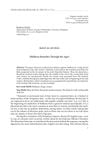 1 citations,
August 2023 in “Diagnostics”
1 citations,
August 2023 in “Diagnostics” Women with PCOS are more likely to develop kidney stones, especially those with certain PCOS types.
1 citations,
August 2021 in “International Journal of General Medicine” Severe and early hair loss may indicate a higher risk of heart disease.
 February 2024 in “Heliyon”
February 2024 in “Heliyon” People with androgenetic alopecia have different lipid levels in their blood, which vary between men and women, and may be linked to a higher risk of metabolic syndrome.
September 2023 in “Membranes” 3D-printed membranes with smart sensors can greatly improve tissue healing and have many medical applications.
 August 2023 in “Journal of Cosmetic Dermatology”
August 2023 in “Journal of Cosmetic Dermatology” QR678 Neo® improved seborrheic dermatitis symptoms in a small group of patients.
 November 2022 in “International Journal of General Medicine”
November 2022 in “International Journal of General Medicine” Women with Polycystic Ovary Syndrome are more likely to have Non-Alcoholic Fatty Pancreas Disease, which is associated with older age, metabolic syndrome, insulin resistance, and high male hormone levels.
 May 2022 in “Maǧallaẗ Buḥūṯ Al-Tarbiyyaẗ Al-Nawʿiyyaẗ (Print)”
May 2022 in “Maǧallaẗ Buḥūṯ Al-Tarbiyyaẗ Al-Nawʿiyyaẗ (Print)” Eating a high inositol diet significantly improves insulin resistance and hormone levels in women with PCOS.
 August 2024 in “Nature Communications”
August 2024 in “Nature Communications” Softer hydrogels help wounds heal better with less scarring.
January 2021 in “Menoufia Medical Journal” Women with pattern hair loss often have higher blood sugar, cholesterol, blood pressure, and waist size, suggesting a link between hair loss and metabolic syndrome.
 January 2023 in “Acta historiae medicinae, stomatologiae, pharmaciae, medicinae veterinariae”
January 2023 in “Acta historiae medicinae, stomatologiae, pharmaciae, medicinae veterinariae” Historical baldness remedies were varied and often based on superstition.
 242 citations,
February 2016 in “Science”
242 citations,
February 2016 in “Science” Hair loss and aging are caused by the breakdown of a key protein in hair stem cells.








